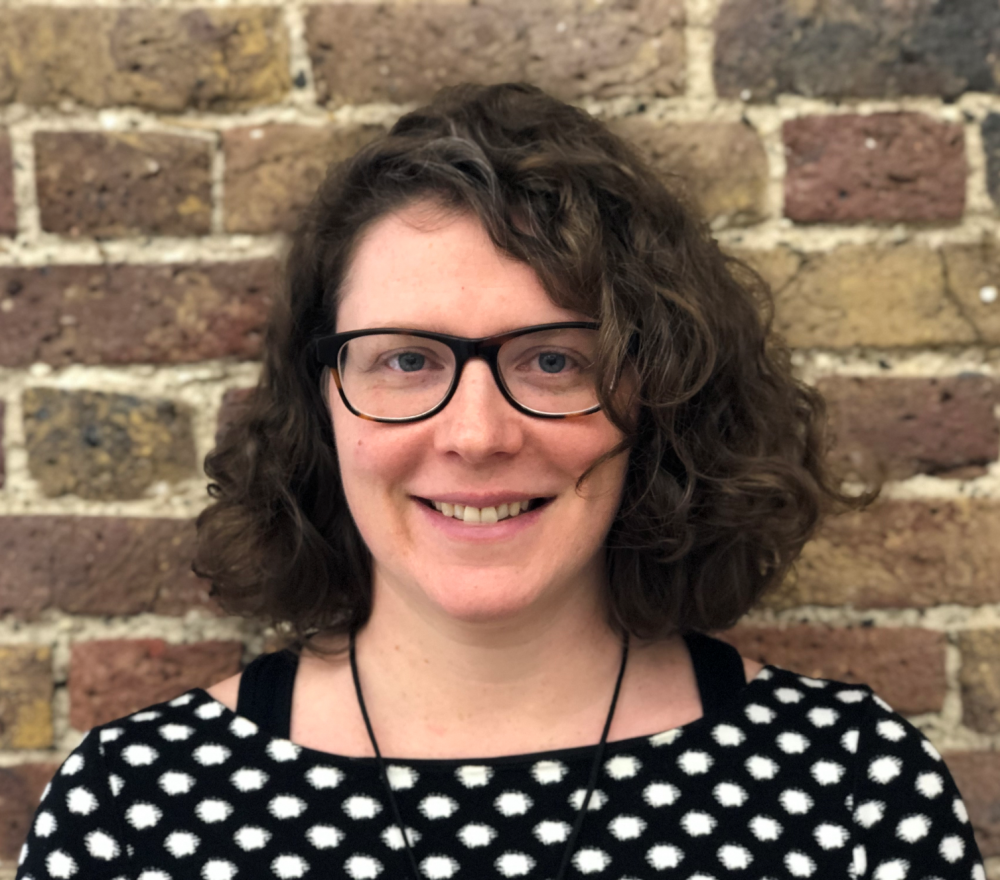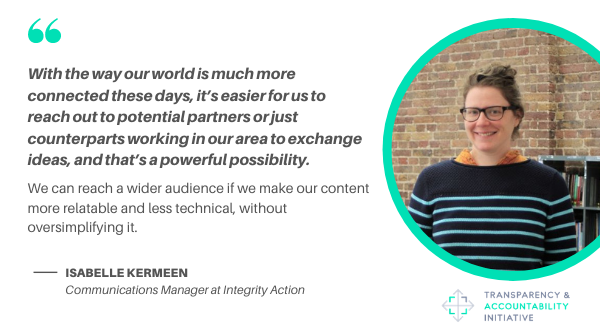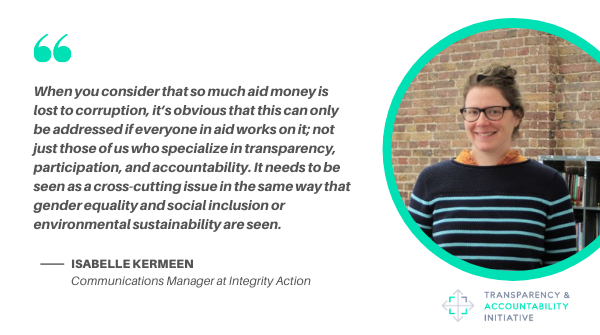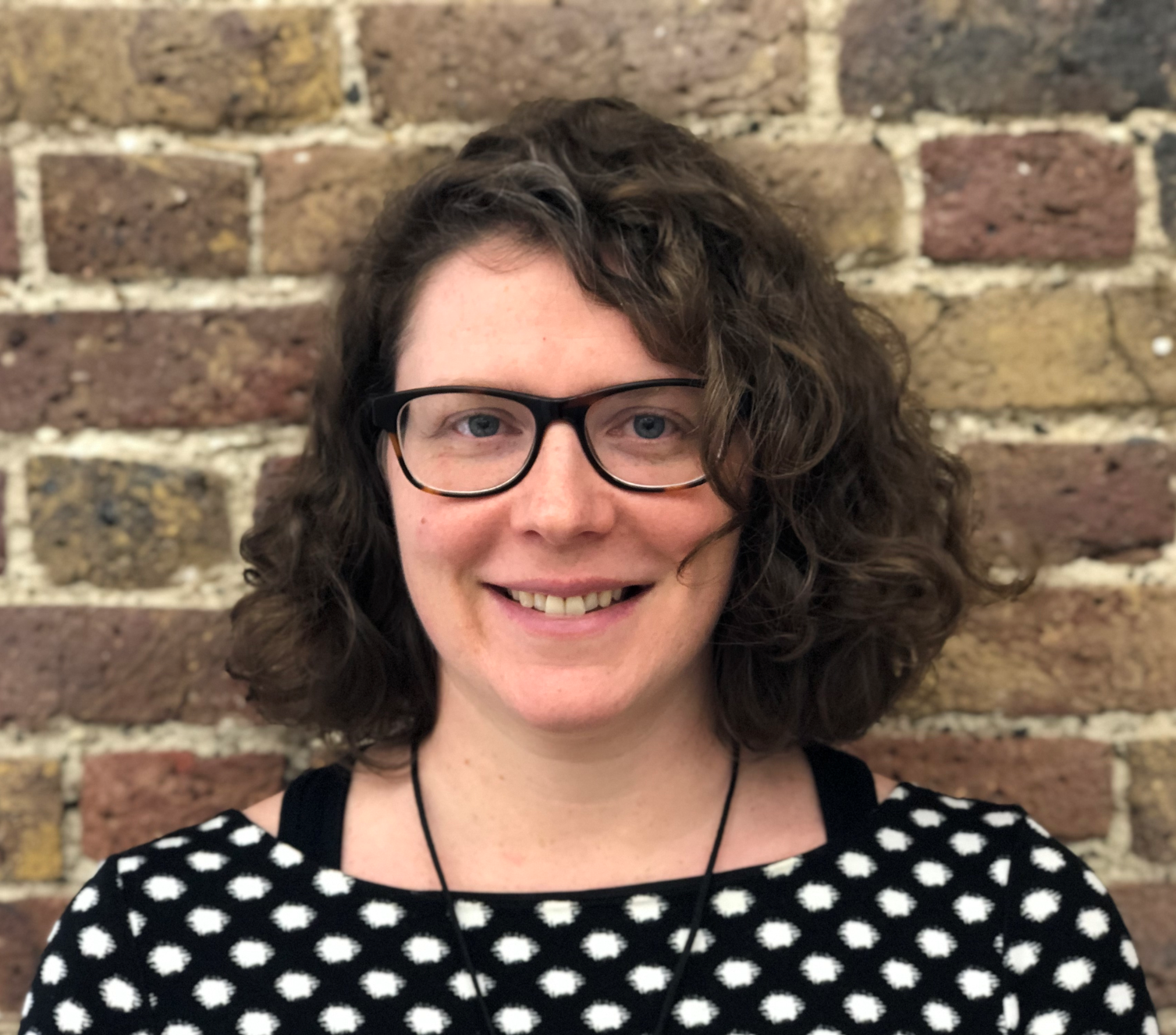Our guest on this week’s “Full Disclosure – the People behind TPA” interview series is Isabelle Kermeen, a communications professional with a background in humanitarian and development communications and advocacy as well as in accountability.
She serves as the Communications Manager for Integrity Action, an organization that helps citizens monitor the delivery of vital projects and services where they live and solve the problems they find.

Isabelle Kermeen. Photo Credit: Isabelle Kermeen
- Great to have you here, Isabelle! How did you find yourself working in the transparency, civic participation, and accountability (TPA) field?
I started out with a passion for social justice and a degree in Modern Languages that led me to a focus on communications and, most recently, to work in the transparency, civic participation, and accountability (TPA) field. For me, it’s been important to work on issues close to my heart. That’s why I have worked with a youth peace organization in Sweden, with an environmental organization in Sri Lanka, and on humanitarian issues for UN OCHA in Sudan, among others.
Because I have come across different types of corruption and misuse of power throughout my career, I feel I have naturally steered myself in this direction – it’s an area where I feel so much can be done. When you consider that so much aid money is lost to corruption and how much could be achieved if funds weren’t misused, it’s obvious that this can only be addressed if everyone in aid works on it, not just those of us who specialize in TPA. It needs to be seen as a cross-cutting issue in the same way as gender equality and social inclusion or environmental sustainability.
Working at Integrity Action is a natural progression for me – for us, it seems obvious that all governments and development actors should be interested in monitoring whether projects and services are delivered as promised (and ensuring that issues are fixed), and also that this should be citizen-led rather than top-down. But it remains a secondary priority for a lot of actors, and so we have our work cut out.
- What do you find most exciting and frustrating about working in the TPA field?
Working to promote citizen-led social accountability (which is what Integrity Action does) is really exciting because we see community monitors who are checking how projects are delivered actually getting results and getting problems fixed. We see that in Kenya, where trust is traditionally low between communities and authorities. The community monitors we work with are now closely engaged with the local authority representatives, so much so that the government officials actively call monitors to get updates on how projects and services are being delivered. Our partners and the communities they work with have been able to build trust to the extent that the relationship works both ways. So when issues arise, there’s a will from both sides to get them addressed.
What’s frustrating is that there’s a persistent belief that corruption only happens elsewhere. This belief seems to be held by NGOs and donors as much as by the general public. You see it in how contracts and partnerships are formed– the due diligence carried out on partner organizations delivering programs overseas (which may be national organizations or locally-focused NGOs or CSOs) is usually quite stringent, but we don’t give our partners the chance to check our paperwork or question our operating systems.

- In communicating TPA issues, what have you found to be most effective?
I think that examples and stories are really useful to show why these issues are important. I am always trying to bring my work to life and draw out the stories which demonstrate the impact of what we are doing. Finding examples that are counterintuitive can be interesting – for example, in Afghanistan, our partner organization works with students in schools who monitor how education is being delivered. When they realized that teacher absenteeism was going unchecked, they started monitoring it, even though this wasn’t one of the key areas they were supposed to be checking. Once teachers knew they were being monitored, they started showing up to teach. So, the students were really able to create a change.
The other thing is that it’s really important to try and tell stories in as genuine a way as possible. So when I collect stories from the communities we work within, say Nepal, I put a lot of effort into ensuring that the story is recounted in a way that is as true to the original as possible. I also feel that there are other ways to tell stories than traditional “case studies” or more academic papers. We can reach a wider audience if we make our content more relatable and less technical without oversimplifying it too much.
- From a communications perspective, what trends in the TPA space excite you the most, and what opportunities do you see for organizations working in this field?
We have a lot of potentials to foster much more learning and collaboration between organizations now that we’re all a bit more open to the possibilities of remote working. We have seen so many online events, from conferences and webinars to online discussion spaces. Making online events more than just presentations to be listened to by having breakout rooms and a proper plan for follow up means we can share our ideas and also our challenges and come out stronger as a sector. It becomes easier for us to reach out to potential partners or just counterparts working in our area to exchange ideas, and that’s a powerful possibility.
We are also being challenged to rethink the way we do communications. At least in the development sector, many actors rely heavily on field trips to collect communications material and stories, but it doesn’t have to be this way. For example, we are rolling out animated videos we have developed to tell different stories about our work and I have collected these in close collaboration with partners and the communities we work with. We use the community members’ own words, and we prioritized getting voice actors from the countries in which the stories take place. I had to do some extra digging to find these voice actors, but it has really been worth it. Who wants to watch a story from Kenya told by an actor from Ghana? Also, by using animation, we were able to craft the story exactly as we want and did not have to worry about collecting the right kind of footage.

- What advice will you give your younger self or anyone starting out as a communications officer in TPA space?
I think that my advice is applicable to everyone but especially women – don’t be afraid to put yourself out there. Too often, I see young women who don’t go for certain opportunities when they don’t feel fully qualified, while men apply for jobs even if they don’t have all the essential skills. I suppose this goes for all sectors, not just the TPA space. But also, as this space is growing but still quite niche, you will find that many skills and experience are transferable, so if you’re coming from another sector and want to start working in TPA, don’t give up. Especially for communications, there aren’t that many people who are communications specialists who are also TPA specialists, so many organizations will recruit someone who has experience of one or the other and will work with the staff member to build their understanding.
- What makes you roll your eyes every time you hear it? And why?
I am a bit of a language nerd, so I think about language a lot, so one thing which really makes me roll my eyes (and feel a bit sick) is when people use terms like “third world countries”. We should really be beyond that by now. I am interested in how language use affects how we interpret the world and the power that language has to do good or bad.
At Integrity Action, we have stopped talking about “anti-corruption” and talk more about “integrity building,” which may seem vague, but it avoids the “finger-pointing” that some people feel when you talk about corruption. Putting a positive spin on it means that we are focusing on the solution, not the problem.
Similarly, I get fed up with people who are offended when they are asked to be more politically correct in their language use. As if making the effort to use a non-offensive term is more trouble than the potential harm you could cause by using language that can really make someone feel uncomfortable or worthless. I like the way this was covered in one of the Guilty Feminist podcasts. Check it out.
